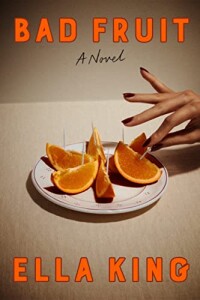 Ella King’s Bad Fruit is a painful but brilliant book. Dealing with domestic life among a family with behavior that can only be described as abusive, the plot builds as strange happenings stack one atop another until something inevitably has to break.
Ella King’s Bad Fruit is a painful but brilliant book. Dealing with domestic life among a family with behavior that can only be described as abusive, the plot builds as strange happenings stack one atop another until something inevitably has to break.
Lily is a high achieving Asian teenager working to hold her fractured family together. She has a mother known for using affection, money, and physical force to get her way, siblings who dislike her for trying to make peace, and a father who has a crush on his former daughter-in-law. All serve to make Lily’s task difficult bordering on impossible.
Lily starts having what she thinks are hallucinations, but they seem to be based on someone else’s life. Making friends outside of the family, while also struggling to reconcile her upbringing and the visions, quickly takes a toll on the girl as her mother becomes increasingly unstable.
Ella King chooses to depict her characters in a flawed yet often sympathetic fashion. indeed, even the worst of those to seem more than a little human. That is often the trap of abuse, after all, expecting it to come from an obvious monster when it is the lashing action of a human being.
Throughout the story, Lily has a steady set of horrified mooments in which she thinks she is seeing visions of her mother’s life. These are suitably disorienting and strange, and leave the reader wondering what exactly is going on with the girl.
Anyone who has suffered gaslighting or abuse – physical, emotional, psychological, or sexual – will feel this volume in their bones. A trigger warning would be appropriate for those who need it, and the variety of types of parental abuse involved ensure a level of trauma affecting the character and perhaps the reader as well. This reviewer often had to put the book down to compensate after a particularly unpleasant incident.
Abuse begets abuse, and someone who suffers regularly will likely do harm in a desperate effort to feel better. Lily writes a letter falsely accusing a friend, an academic, of assaulting her. Even though he understands where the accusation came from, it still causes him to panic. At the same time the reader understands that she did this in a misguided therapeutic purpose, and didn’t make the false accusation pubicly. Those facts served greatly to mitigate any concerns a reader might have about messages related to false accusations.
Bad Fruit is an easy book to recommend if the reader is after human stories. It has elements that lean at times towards noir, crime, mystery, fantasy, and magical realism, though it is not fully any of those genres. A warning, though: The pain one feels while reading the book is visceral, even if you don’t have similar trauma in your own background.
(Astra House, 2022)
